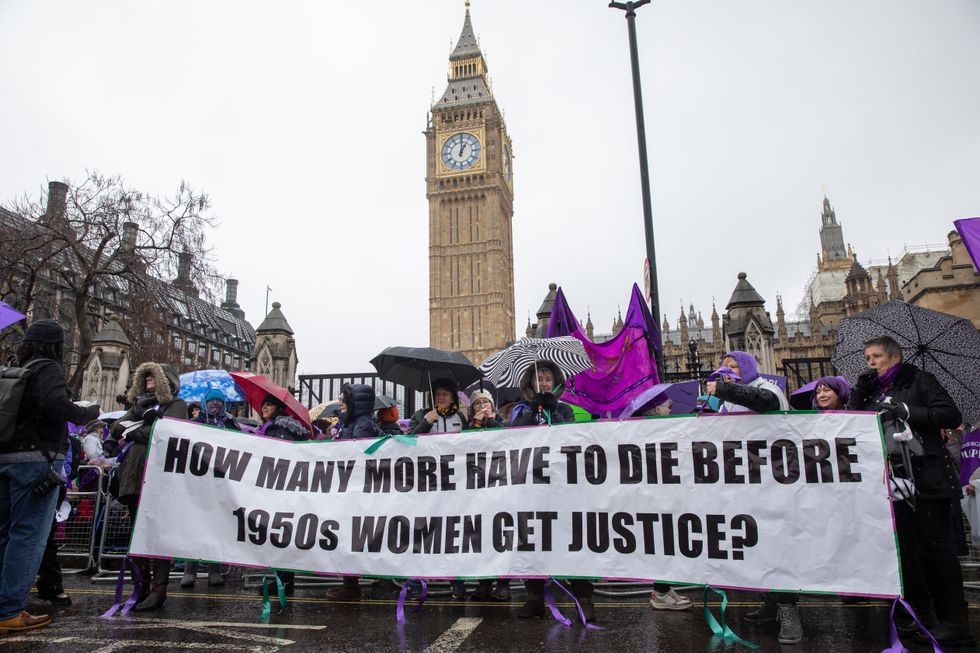State pension age hikes to 71 may be inevitable but past mistakes must not be repeated, says Jessica Sheldon

WASPI are among the campaign groups set up in response to the way the state pension age changes for women were introduced
|GETTY

State pension age hikes won’t be popular among voters but it’s the Government’s duty to publicise changes they make, writes Jessica Sheldon
Don't Miss
Most Read
Latest
Whether it’s a fully costed out five-year plan or a general idea of what you’d like your life to look like, many of us have some financial goals for the future in mind.
Of course, life is full of surprises, and planning ahead doesn’t mean there won’t be curveballs, but building up savings can certainly be a comfort.
The concern is that the goalposts change after major life decisions have already been made, and it’s too late to make alternative arrangements.
It’s a problem that's been experienced by many women born in the 1950s who say they did not receive adequate communication about the state pension age changes for women.

Many women born in the 1950s say they did not receive adequate communication about the state pension age changes for women
|GETTY
I’ve heard first-hand of the impact the hikes to the state pension age for women - which increased from 60 to 65 to be in line with men before it increased again to 66 - have had.
Many women have told me they had already left the workforce before they realised they had to wait years longer than they thought before they could claim the UK state pension.
Some had no choice but to use up savings meant to last them long into retirement. Others have recalled the struggle of finding a job in their late 50s and 60s.
Sentiments of ageism and health problems meant getting a job to plug the income gap they faced was, for many, simply not an option.
In stage one of their investigation, the Parliamentary Ombudsman found that between 1995 and 2004, the DWP’s communication of changes to the state pension age reflected the standards they would expect it to meet, but in 2005, the DWP failed to make a “reasonable decision about targeting information to the women affected by the changes”. They found this was maladministration.
A think tank this week said the state pension age - currently 66 - would need to rise to 71 by 2050 to maintain the number of workers per retiree.
In 2006, the DWP proposed writing to women individually to tell them about changes to their state pension age but the Parliamentary Ombudsman found it failed to act promptly, they also found this was maladministration.
The ombudsman is looking again at part of the stage two findings.
The state pension forms the bedrock of retirement savings for much of the population, but rising life expectancy – combined with the recent higher-than-expected increases under the triple lock – mean the affordability has been called into doubt.
A think tank this week said the state pension age - currently 66 - would need to rise to 71 by 2050 to maintain the number of workers per retiree.
It could be even sooner; the International Longevity Centre report suggested it may need to reach 70+ by 2040 to maintain the current dependency ratio if the UK's working adult population is defined as 20 to 64 years, to account for time spent in full-time education.
Currently, the state pension age is set to rise from 66 to 67 between April 2026 and April 2028.
It's then set to increase from 67 to 68 between April 2044 and April 2046, but this is subject to a state pension age review within two years of the next Parliament.
The government has said it remains committed to the principle of providing 10 years' notice of changes to the state pension age.
Like it or not, we are going to get to a point when policymakers, whoever may be in power, need to decide what to do about the state pension age.
And if they do increase it to 70 or 71, they need to be bold and make sure each of us is aware, with plenty of notice. Even if they are worried they won’t be popular.
LATEST DEVELOPMENTS:
I don't think it'll be enough to write letters and hope people don’t ask too many questions.
We need our policymakers to take substantial steps to reduce any chance of people missing out on getting the memo.
We need to make sure everyone understands exactly what it means and how it could affect them. And we need that to happen early, so we can prepare.
I think these potential state pension age hikes offer a more concerning outlook to working-age Britons than the recent proposal for a new four-point guarantee.
Under this suggestion, put forward by the IFS, the Government would need to decide on an appropriate level for the new state pension relative to average earnings. Once it reaches this, they would replace the triple lock with a new system where the state pension keeps pace with growth in average earnings in the long run, and always increases at least in line with inflation each year.
As I wrote at the time, I don’t think it is a bad idea for the current generation. It could give us a more certain direction for the future of the state pension.
Whatever policymakers decide, I am certain the UK can’t kick the can down the road any longer.
It’s time to have the conversation about what the state pension will look like in years to come.
We need decision-makers and leaders who are thinking about the long term, not political point-scorers simply trying to win votes in the next election.
A DWP spokesperson said: "The Government decided over 25 years ago that it was going to make the state pension age the same for men and women.
"Both the High Court and Court of Appeal have supported the actions of the DWP, under successive governments dating back to 1995, and the Supreme Court refused the claimants permission to appeal."










